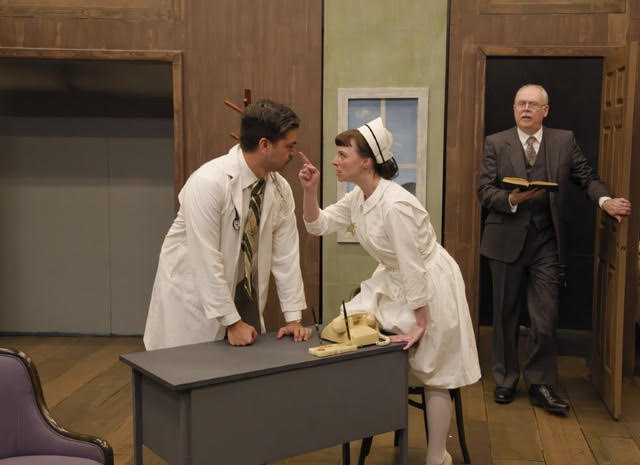You never know how you’ll mourn the death of a loved one. Some people weep, some people stay stoic, with all kinds of responses in between — including seeing a six-foot tall rabbit.
That’s what happens to Elwood P. Dowd after his mother dies in Mary Chase’s 1944 Pulitzer Prize-winning play, Harvey, which is the name of Elwood’s anthropomorphic bunny buddy that’s invisible to everyone else.
Well, almost everyone else. Veta Louise is Elwood’s socialite sister, and since her brother’s hallucination can really hamper her high-society climb (Elwood’s eager to introduce Harvey to everyone) she naturally tries to commit him to a sanitarium. But through a comedy of errors, Veta lets slip that she’s seen Harvey too, and is committed herself instead.
There’s a strong undercurrent of darkness in the plot, but director Rebecca Bissonnette, who loved the play’s movie adaptation starring Jimmy Stewart as a child, says the overall tone is upbeat, a bit silly, and even joyful. “Mary Chase has done a great job at peppering the script with witty writing, some great jokes and some really colourful, lively characters,” Bissonnette says. “There’s not a dull one in the bunch.”
That said, it’s a script of its time, so some words had to go. “Some of the concepts and language just probably shouldn’t be said in 2023,” explains Bissonnette. “But, as a story, we made the choice to lean heavily into the lightheartedness and to get the audience to go back in time with us.”
Today, Bissonnette says Elwood “would probably be considered neurodivergent,” but back then, his way of mourning was something that needed to be fixed — in this case, with a Harvey-erasing injection that will return Elwood to “normal.” But the injection’s up to Veta, who by the end of the play isn’t so sure her brother really has a problem — a choice Bissonnette hopes the audience will ponder after all the laughs.
